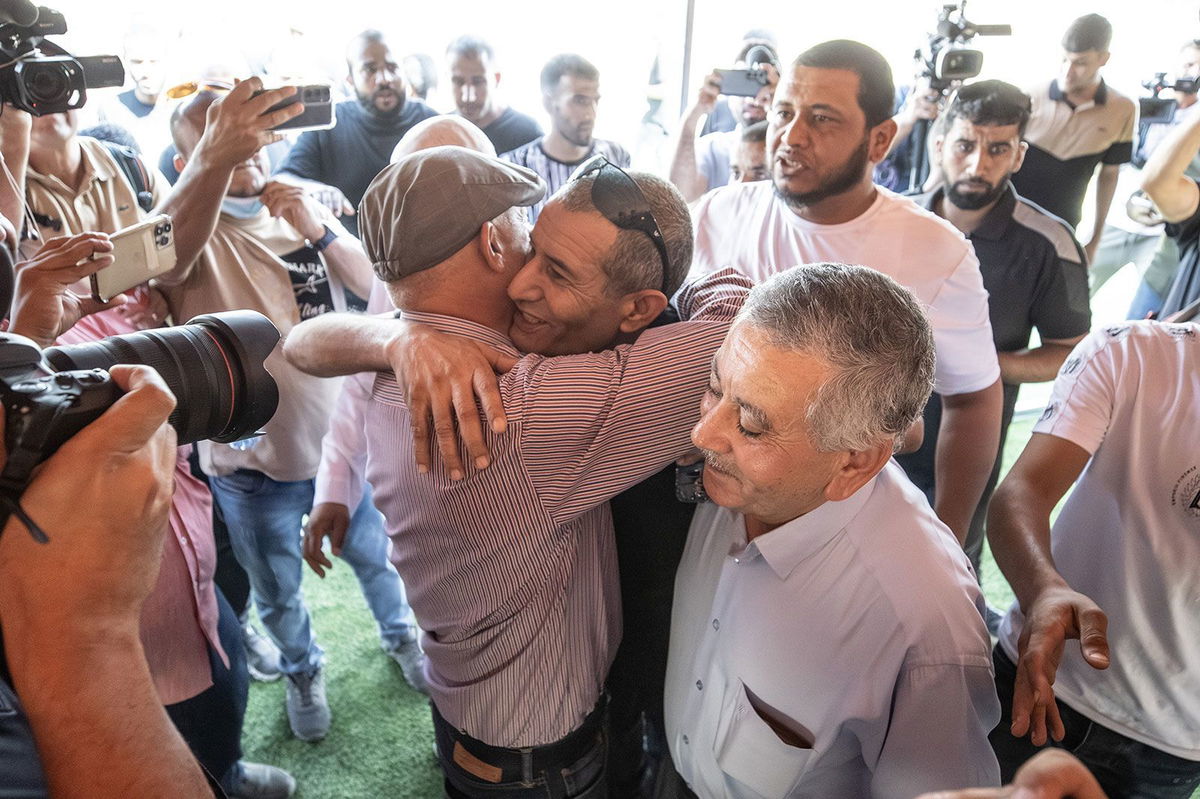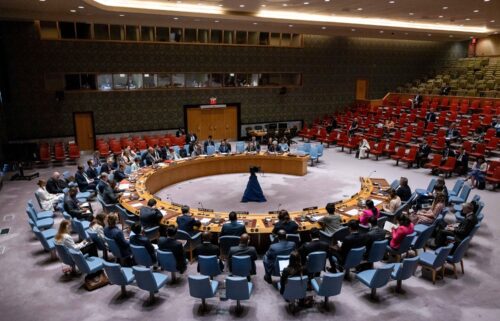Frail and malnourished, rescued hostage hopes war in Gaza ends ‘for all Palestinian and Israeli families’

Bedouin Israeli former hostage Al-Qadi
Negev, Israel (CNN) — After more than 300 days in Hamas captivity, a frail and malnourished Farhan Al-Qadi sat in a large tent set up by his family and friends in the Negev desert, where loved ones came by to welcome him home on Wednesday.
“I am well,” Al-Qadi told reporters, adding that he wishes “that the war ends for all Palestinian and Israeli families.”
“I know that there are negotiations in Cairo,” he said regarding ongoing discussions on a proposed ceasefire-for-hostages deal aimed at halting the fighting. “I wish to God that this is all resolved.”
The 52-year-old Bedouin Israeli citizen from southern Israel lost some 65 pounds (30 kilograms) in captivity, his family told CNN, and his complexion appeared pale from lack of sun exposure. His eyes were glassy, often seeming tired.
The Israeli military said Tuesday that Al-Qadi is the eighth hostage to be rescued alive in Gaza by the Israeli military since the beginning of the war – but he is the first to have been reclaimed alive from inside Hamas’ tunnel network underneath Gaza
Al-Qadi sat at the center of long rows of plastic chairs, where visitors greeted him with long embraces and kisses on the cheek in a gathering near Tarabin – one of Israel’s many unrecognized Bedouin villages.
With limited power and water services, the village is about 20 miles from the Gaza Strip and is not protected by Israel’s Iron Dome defense system. The closest city is Rahat, which is the largest Arab Bedouin city in Israel.
The Bedouin community – a Muslim, semi-nomadic, and ethnically Arab group – is considered a subset of Israel’s Arab population, which makes up about 20% of the total population.
While some identify as Bedouin Israelis, others see themselves as Palestinian citizens of Israel. Unlike Jewish Israelis, Bedouins are not required to serve in the Israeli military, though some choose to volunteer, often serving in specialized units like the Gadsar 585, known as the Bedouin battalion, which operates in the Negev desert, where most Bedouins originate.
‘Isolated alone’
From the village, CNN’s team on the ground could hear heavy strikes and impacts from the nearby Gaza Strip.
Fayez Sohaiban, Al-Qadi’s relative and the former mayor of Rahat city, said the former hostage had lived in captivity not knowing what his fate would be the next day, and food “was almost nonexistent.”
Al-Qadi was working as a security guard in Kibbutz Magen when he was taken 11 months ago.
He told reporters on Wednesday that he spent a lot of his time in a tunnel, and had not seen the sky for eight months before his rescue. He added that he did not meet other hostages during his time in Gaza. “No one, no. Not once,” his brother, Juma’a, said, adding that Al-Qad was “isolated alone” the entire time.
Ali El-Ziyadne, whose brother and nephew were also kidnapped on October 7 and remain in Gaza, joined the Bedouin community to welcome Al-Qadi home. His brother, Youssef Ziyadne, and nephew, Hamza Ziyadne, have been held hostage by Hamas for 11 months, he said.
“We are afraid for their lives. We don’t know anything about them,” El-Ziyadne told CNN, adding that Youssef suffers from diabetes. El-Ziyadne said he pleaded several times to Hamas that they release his relatives, who are Muslim, hoping to appeal to the group’s “Islamic values and humanity.”
El-Ziyadne asked about his brother and nephew when he met Al-Qadi, but the former hostage did not see them, he said.
Before Israel’s founding in 1948, the Negev was home to 92,000 Bedouins, but only 11,000 remained after the Arab-Israeli war of that year, according to Minority Rights Group. Those who stayed are “treated harshly, uprooted time and again and forced to live in reservations,” the international human rights organization added.
According to the National Library of Israel, there are almost 250,000 Bedouins, many of whom live in towns that are yet to receive recognition from the state, while others live in unincorporated villages.
Al-Qadi’s rescue means there are now 103 hostages from the October 7 attack being held in Gaza, according to figures from the Israeli prime minister’s office and the Hostages and Missing Families Forum. Last week the bodies of six Israeli hostages were retrieved from Gaza during an overnight military operation in Khan Younis, Israeli authorities said.
Hopes of a ceasefire-for-hostages deal, which would halt fighting in Gaza and see the return of people held by Hamas, have repeatedly been raised and dashed in recent months.
Negotiators are continuing to work on a deal, and have met with increasing intensity in recent weeks. Talks made progress over the weekend, according to a senior US official familiar with the discussions in Cairo, Egypt, where mediators discussed “final details” of a potential agreement. An Israeli delegation is expected to head to Doha on Wednesday for ceasefire talks.
The-CNN-Wire
™ & © 2024 Cable News Network, Inc., a Warner Bros. Discovery Company. All rights reserved.

